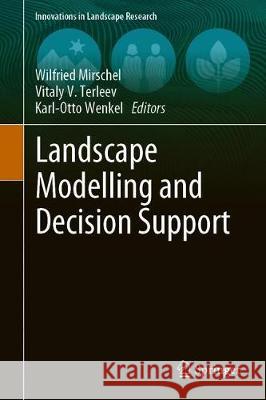Landscape Modelling and Decision Support » książka



Landscape Modelling and Decision Support
ISBN-13: 9783030374204 / Angielski / Twarda / 2020 / 593 str.
Landscape Modelling and Decision Support
ISBN-13: 9783030374204 / Angielski / Twarda / 2020 / 593 str.
(netto: 575,06 VAT: 5%)
Najniższa cena z 30 dni: 578,30
ok. 22 dni roboczych.
Darmowa dostawa!
Modelling and simulation of agricultural landscapes.- Challenges and perspectives for integrated landscape modelling to support sustainable land use management in agrolandscapes.- Application of ecosystem modelling methodology on rural areas of Crimea - Systematic approach.- Integral assessment of condition and sustainability of socio-ecological-economic systems.- The use of observation methods and model approaches for estimating regional crop evapotranspiration and yield in agro-landscapes.- Development of landscape-adaptive land use of the Upper Volga region based on geostatistical methods.- Modelling of the suitability of lands to the agrarian use and their resistance to negative processes.- A GIS-based model for the enhancement of rural landscapes: the case-study of Valdera - Tuscany (Italy).- Models for describing landscape hydrochemical discharge in mountain countries.- Agent-based modelling of a simple synthetic rangeland ecosystem.- The use of multitemporal spectral information to improve the classification of agricultural crops in landscapes.- Global evaluation of the status and sustainability of terrestrial landscapes and water bodies.- Spatial Estimation of Estonian Forest Landscapes’ Soil Cover Humus Status: Methods, Model samples and Assessments.- Dynamics of soil organic matter in agricultural landscapes.- Model based assessment of nutrient load into water bodies from different landscape types.- Model-based estimation of irrigation water demand for different agricultural crops under climate change, presented for the Federal State of Brandenburg, Germany.- Forecasting scanning branches of the hysteresis soil water-retention capacity for calculation of precise irrigation rates in agrolandscapes using a mathematical model.- Estimation of Leaf Area Index (LAI) of Russian Forests Using a Mechanical Model and Forest Inventory Data.- Assessment approach of the spatial wheat cultivation risk for the main cereal cropping regions of Russia.- Model based forecasting winter wheat yields using landscape and climate data.- Actual and model-based assessment of Castor fiber populations for different reserves in the European part of Russia and their impact on ecosystems.- Modelling biodiversity and ecosystem services trade-offs in agricultural landscapes to support planning and policy-making.- Simulating the Effects of Agrochemicals and Other Risk-Bearing Management Measures on the Terrestrial Agrobiodiversity: the RISKMIN Approach.- LandCaRe-DSS – An interactive model-based decision support system for assessing the impacts of climate change on agriculture and agricultural landscapes.- A spatial analysis framework to assess responses of agricultural landscapes to climates and soils at regional scale.- Integrated modelling approach for land-use changes on different scales.- Assessment of soybeans crop management strategies using crop growth models for Central Brazil.- Estimation of Agro-landscape Productivity in Regional Scale using Dynamic Crop Models in a GIS Environment.- Landscape phenology modelling and decision support in Serbia.
This book contributes to a deeper understanding of landscape and regional modelling in general, and its broad range of facets with respect to various landscape parameters. It presents model approaches for a number of ecological and socio-economic landscape indicators, and also describes spatial decision support systems (DSS), frameworks, and model-based tools, which are prerequisites for deriving sustainable decision and solution strategies for the protection of comprehensively functioning landscapes. While it mainly focuses on the latest research findings in regional modelling and DSS in Europe, it also highlights the work of scientists from Russia. The book is intended for landscape modellers, scientists from various fields of landscape research, university teaching staff, and experts in landscape planning and management, landscape conservation and landscape policy.
1997-2026 DolnySlask.com Agencja Internetowa
KrainaKsiazek.PL - Księgarnia Internetowa









